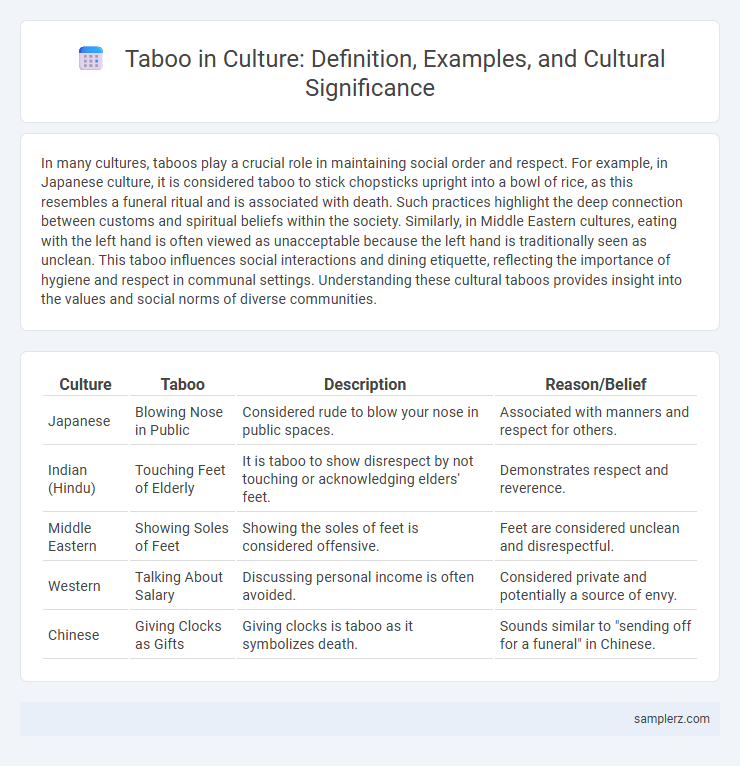In many cultures, taboos play a crucial role in maintaining social order and respect. For example, in Japanese culture, it is considered taboo to stick chopsticks upright into a bowl of rice, as this resembles a funeral ritual and is associated with death. Such practices highlight the deep connection between customs and spiritual beliefs within the society. Similarly, in Middle Eastern cultures, eating with the left hand is often viewed as unacceptable because the left hand is traditionally seen as unclean. This taboo influences social interactions and dining etiquette, reflecting the importance of hygiene and respect in communal settings. Understanding these cultural taboos provides insight into the values and social norms of diverse communities.
Table of Comparison
| Culture | Taboo | Description | Reason/Belief |
|---|---|---|---|
| Japanese | Blowing Nose in Public | Considered rude to blow your nose in public spaces. | Associated with manners and respect for others. |
| Indian (Hindu) | Touching Feet of Elderly | It is taboo to show disrespect by not touching or acknowledging elders' feet. | Demonstrates respect and reverence. |
| Middle Eastern | Showing Soles of Feet | Showing the soles of feet is considered offensive. | Feet are considered unclean and disrespectful. |
| Western | Talking About Salary | Discussing personal income is often avoided. | Considered private and potentially a source of envy. |
| Chinese | Giving Clocks as Gifts | Giving clocks is taboo as it symbolizes death. | Sounds similar to "sending off for a funeral" in Chinese. |
Understanding Taboo: Definition and Cultural Relevance
Taboo refers to prohibitions or restrictions within a culture that dictate behaviors or topics considered socially unacceptable, such as touching sacred objects or discussing death openly. These customs serve to maintain social order and reinforce community values by delineating what is forbidden. Understanding taboo is crucial for appreciating cultural norms and avoiding actions that could offend or disrupt societal harmony.
Food Taboos Across Different Societies
In many cultures, food taboos play a significant role in shaping dietary practices and social interactions. For example, in Hindu society, beef consumption is strictly avoided due to the sacred status of cows, while in Islamic culture, pork is considered haram and thus forbidden. These food restrictions reflect deep religious beliefs and cultural identities, influencing both daily meals and communal celebrations.
Taboos Surrounding Death and Mourning
In many cultures, discussing death openly is considered taboo, as it is believed to invite misfortune or disturb the spirits of the deceased. For example, in Japanese culture, the number four is avoided during funerals because it sounds like the word for "death," reflecting deep respect for the mourner's emotional state. Similarly, in certain African tribes, touching the deceased's body is forbidden to prevent the transfer of evil spirits or bad luck to the living.
Marriage Customs and Related Taboos
In many cultures, marriage customs are steeped in taboos that dictate acceptable behaviors and rituals. For example, in some South Asian communities, marrying within the same clan or gotra is strictly forbidden to avoid incestuous relationships and preserve genetic diversity. Similarly, in parts of Africa, marrying outside one's ethnic group can be socially taboo, reflecting deep-rooted values about cultural preservation and identity.
Body Modifications: Accepted Art or Social Stigma?
Body modifications such as tattoos and piercings are embraced as forms of self-expression and cultural identity in many societies, yet they remain taboo and stigmatized in others due to religious beliefs or social norms. In countries like Japan, visible tattoos are often associated with criminality, leading to social exclusion despite their artistic value. Conversely, indigenous communities around the world uphold body modifications as sacred traditions that signify rites of passage, status, or spiritual connection, highlighting the complex cultural perceptions of these practices.
Religious Taboos: Practices Prohibited by Faith
In many cultures, religious taboos explicitly prohibit certain behaviors to maintain spiritual purity and communal harmony. Examples include the Islamic prohibition of consuming pork, the Hindu avoidance of beef due to the sacred status of cows, and the Jewish restriction against working on the Sabbath. These taboos are deeply rooted in sacred texts and rituals, shaping the moral and social frameworks within their respective faith communities.
Language Taboos: Words You Should Never Say
Language taboos vary significantly across cultures, as certain words or phrases are considered deeply offensive or forbidden due to historical, religious, or social reasons. In Japanese culture, direct refusal using the word "no" is often avoided to maintain harmony and politeness, reflecting the importance of indirect communication. Similarly, in many Middle Eastern societies, blasphemous terms or insults toward religious figures are strictly taboo, highlighting the sacred role language plays in cultural identity and respect.
Gender and Sexuality Taboos in Traditional Cultures
In many traditional cultures, strict gender roles enforce taboos against non-heteronormative sexualities, such as the prohibition of same-sex relationships and transgender identities. These taboos often manifest through social ostracism, legal penalties, or spiritual sanctions designed to preserve ancestral customs and perceived moral order. The enforcement of such norms reinforces binary gender categories and suppresses diverse expressions of sexuality within these cultural frameworks.
Social Interaction Taboos: What Not to Do in Public
In many cultures, public displays of affection, such as kissing or hugging, are considered social interaction taboos and can result in discomfort or offense. Avoiding direct eye contact in certain Asian societies, like Japan, is deemed respectful, while prolonged staring is seen as invasive. Speaking loudly or interrupting elders during conversations is frowned upon in Middle Eastern cultures, highlighting the importance of understanding specific public etiquette norms.
Breaking Taboos: Consequences and Cultural Shifts
Breaking taboos, such as publicly criticizing religious figures in conservative societies, often leads to social ostracism, legal penalties, or even violence. These consequences reinforce cultural norms and discourage dissent, maintaining societal cohesion. However, cultural shifts driven by globalization and digital communication increasingly challenge these taboos, leading to gradual changes in social attitudes and legal frameworks.

example of taboo in custom Infographic
 samplerz.com
samplerz.com